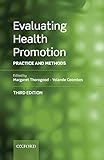Evaluating health promotion : practice and methods / edited by Margaret Thorogood and Yolande Coombes.
Material type: TextPublication details: Oxford ; New York : Oxford University Press, 2010.Edition: 3rd edDescription: viii, 220 p. ; 22 cmISBN:
TextPublication details: Oxford ; New York : Oxford University Press, 2010.Edition: 3rd edDescription: viii, 220 p. ; 22 cmISBN: - 9780199569298 (alk. paper)
- 0199569290 (alk. paper)
- 362.1 22
- RA 427.8 .E95 2010
- 2010 G-115
- WA 590
| Current library | Collection | Call number | Vol info | Status | Date due | Barcode |
|---|---|---|---|---|---|---|
| Judith Thomas Library General Stacks | BKS | RA 427.8 .E95 2010 (Browse shelf(Opens below)) | AUA001154 | Available | AUA001154 |
Includes bibliographical references and index.
Machine generated contents note: -- <strong>1: Overview </strong>1. Introduction, <em>Yolande Coombes and Margaret Thorogood</em>2. Historical and policy approaches, <em>Virginia Berridge</em><strong>Part 2: Methods of evaluation </strong>3. Evaluating according to purpose and resources: Strengthening the evidence base incrementally, <em>Yolande Coombes</em>4. Evaluating interventions: Experimental study designs in health promotion, <em>Annie Britton</em>5. Economic evaluation of health promotion interventions, <em>Warren Stevens</em>6. Using systematic reviews in health promotion, <em>Margaret Thorogood</em>7. Process evaluation: Understanding how and why interventions work, <em>David Ellard and Suzanne Parsons</em><strong>Part 3: Evaluation in practice </strong>8. Social marketing interventions and evaluation, <em>Steven Chapman</em>9. Evaluation of interventions to prevent intimate partner violence, <em>Rachel Jewkes</em>10. Evaluating environmental interventions through natural experiments, <em>Melvyn Hillsdon</em>11. E-health promotion, <em>John Powell</em><strong>Part 4: Participants in, and users of, evaluation </strong>12. Involving lay people in the development of NICE public health guidance, <em>Jane Cowl</em>13. Evaluating the ethics of health promotion: Understanding informed participation, <em>Dalya Marks</em>14. Feeding back evaluation results to stakeholder participants, <em>Yolande Coombes</em>15. Getting findings into policy, <em>Carol Tannahill</em>16. Conclusions: Providing appropriate evidence and influencing policy, <em>Margaret Thorogood and Yolande Coombes</em>.
"Health Promotion is a relatively new discipline and there is little in the way of practical help for students and practitioners in choosing and implementing appropriate evaluation methods. As the demands for rigorous evaluation and evidence-based decision-making increase, health promotion cannot ignore the need for accurate, reliable and valid methods to carry out evaluation. This book provides clear descriptions (with plentiful practical examples) of such methods, and the problems that can arise from their implementation. Both qualitative and quantitative methods that are commonly used are described and the problems and benefits that arise with their use are explained. Experiences in the practical implementation of evaluation are explained, with examples from a variety of different social, economic and cultural contexts. The third edition of this highly successful book has been fully revised and updated to reflect the ongoing developments in the field of health promotion. It will appeal to students and practitioners in health promotion and public health (including programme managers in both the government and the voluntary sector), and donors and funding agencies who commission health promotion interventions and evaluations"--Provided by publisher.
